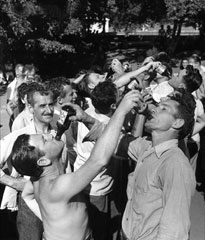
| HOME |
| NERVE |
| REVIEWS |
| ARCHIVE |
| EVENTS |
| LINKS |
| ABOUT US |
| CONTRIBUTORS |
| BACK ISSUES |
| CONTACT US |
 24
hour drinking: A cocktail for disaster?
24
hour drinking: A cocktail for disaster?
The tabloid press and television news reports would have us believe
that the introduction of 24-hour drinking by the government will lead to drunken mayhem and bloodshed
on the streets of our towns and cities.
But what is the reality?
It is hoped that permitting pubs and clubs to stay open all day - the
proposals come into effect in November - will stagger closing times and
avoid drinkers spilling onto the street at the same time.
But the police disagree. The former Commissioner of the Metropolitan Police said: "The fact that large groups of people will be coming out at 3am or 4am will mean we have to manup the streets to deliver a service to ensure these people behave."
In a BBC Documentary 'Drunk and Dangerous', a police spokesman stated that "If you extend the closing hours to beyond 2 or 3 am to 24 hours, it will add extra points of pressure on the police in dealing with potentially unruly behaviour from two or three times to four and five times throughout the night.
He added: "Extra resources will be needed to deal with this, at the expense of neighbourhood policing, and I strongly believe that the drinks industry, who will benefit financially from the change, should pay for the extra resources that will be required by the police."
Tessa Jowell, Secretary of State for Culture, in a similar vein, contends that the drinks industry "should foot the bill for the extra policing costs for the extended opening hours.
"We expect them, on a voluntary basis, to make a contribution to the costs of running what is called the night-time economy."
But a spokeswoman from the British Bars and Pubs Association (BPA) said
"The police should use the existing powers they have to tackle offenders",
and pointed out that the drinks industry already contributes £22
billion in duty on alcohol sales.
A survey of nearly 30,000 pubs in the UK by BPA revealed that not a single
pub was planning to open all night.
"The idea that pubs will be open round the clock is a myth," commented the representative from the BPA. "Most licensees are just considering opening to midnight or 2am over the weekend at the latest."
This view concurred with a straw poll I conducted with several pubs in Liverpool city centre and in the suburbs. Most of them said they would perhaps open an extra hour on Friday and Saturday nights but weekday opening hours would remain the same.
Liverpool licensing officers have predicted that 75% of licensed premises will take advantage of the new laws, opting to stay open for more hours, but said none had applied to stay open round-the-clock.
Nevertheless, several clubs in Liverpool, currently open until 2 or 3am, were preparing to apply to stay open between 4 and 7am on a Saturday and Sunday night.
At present, drink licences are granted by magistrates, with the standard licensing hours being 11 am to 11 pm. Bars and pubs can apply, again to the magistrate, for extensions to these hours, but on an individual basis. These opening hours date from the First World War and were designed to prevent munitions workers from coming to work drunk.
Prior to the war, licensees had the option to remain open all through the night if they wished, and children could drink in pubs with their parents. It's hard to argue with the view by medical experts that extra drinking hours will inevitably lead to more alcohol being consumed and thus lead to potentially more problems of ill-health. One in four people in the UK were already drinking far more than the recommended daily intake, according to the Royal College of Physicians.
"It is fanciful to think that we can turn ourselves into a French-style wine tippling country merely by abolishing licensing regulations," said professor Ian Gilmore of the Royal Liverpool University Hospital.
"It will cause an increase in alcohol-related injuries and accident and emergency units in hospitals, already stretched to the limit of their resources at weekends, and will worsen the binge drinking culture.
"To introduce 24 hour drinking when we are in the middle of an epidemic of binge drinking flies in the face of logic. In the long-term there will be an increase in alcohol-related illnesses.
"If we took alcohol out of the equation, the work in A & E would drop by 90% at the weekends," he added.
In the final analysis, market forces will play the key role in deciding whether drinking outlets will take advantage, to whatever extent, the opportunity to open longer. They will only stay open later than at present if there is a profit involved for them.
Printer friendly page